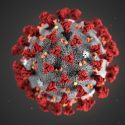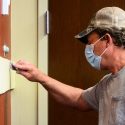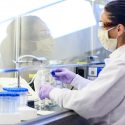Here’s what you should know about COVID-19 vaccination at UW–Madison
Read this message in
Since Jan. 5, 2021, when University Health Services began providing COVID-19 vaccines to members of the UW–Madison community, more than 7,000 shots have been given to eligible employees and students. This includes both first and second doses of the two-dose Pfizer-BioNTech and Moderna vaccines.
“It’s been fantastic to begin offering vaccine to our employees and students who meet the state’s criteria for vaccination,” says UHS interim medical director Patrick Kelly. “We are administering as many doses as we can each day and will continue to do so for as long as we receive vaccine and have people to vaccinate.”
Right now, eligible members of campus include:
- those who perform direct patient service duties, including physicians and students with clinical roles, that bring them in contact with patients who are able to transmit the SARS-CoV-2 virus. This includes medical students and students in nursing, pharmacy, and even social work and education students in clinical settings;
- COVID-19 testing staff, and researchers and other personnel who have direct contact with virus and virus specimens;
- employees of the UW Police Department; and
- active members of the campus community aged 65 and older.
While we know many of our students and employees are eager to be vaccinated — and this is good news for public health and the safety of our community — we must continue to follow state guidance.
In the meantime, here is what you should know about vaccination at UW–Madison:
Who decides who and when people are eligible for vaccines?
UW–Madison follows eligibility and prioritization criteria from the Wisconsin Department of Health Services, which are determined by the federal Advisory Committee on Immunization Practices and the State Disaster Medical Advisory Committee. According to DHS, groups are being prioritized according to risk of exposure or vulnerability to COVID-19.
Who will be eligible next?
Beginning on or around March 1, DHS will expand eligibility to include the following individuals at UW–Madison:
- education and childcare (including faculty and staff with direct student contact)
- some public-facing essential workers (including utilities and communications infrastructure personnel)
- non-frontline essential health care personnel (including those who perform health care support roles, such as cleaning)
Campus is working to better define eligible individuals on campus under the state’s criteria and UHS will notify and offer appointments to eligible individuals as vaccine is available. We expect it will take some time to vaccinate everyone in this group. Please do be patient and know that UHS is also eager to get you vaccinated.
Why can’t we vaccinate people more quickly?
UHS can only administer as much vaccine as is allocated by the state, and the state matches vaccine needs to available supply. We are working as quickly as possible to provide vaccine to everyone eligible, while also anticipating future vaccine supply needs.
Are UW–Madison students and employees required to get a COVID-19 vaccine?
At this time, there is no requirement for members of campus to be vaccinated against COVID-19.
Can you choose which vaccine you receive?
Because vaccine supplies are limited, you will be offered whichever vaccine is available at the time you come in for your appointment. UW–Madison is currently receiving both the Pfizer and the Moderna vaccines.
Will I be exempt from campus testing after I have been vaccinated?
At this time, no. The two currently authorized vaccines are 90-to-95 percent effective at preventing people from becoming sick with COVID-19, but a small number of vaccinated people may remain susceptible. And we don’t yet know if vaccinated people can still pass the virus to others. The Centers for Disease Control and Prevention is conducting studies to better understand transmission within the vaccinated population and guidance may change at a later date. It’s important to remember, too, that it can take up to two weeks after the second dose before you have the full protection the vaccines offer.
Will the vaccines work against new variants if they arrive on campus?
Researchers continue to gather information about the effectiveness of current vaccines against new, more transmissible variants of the virus that causes COVID-19. Some early studies suggest the Pfizer-BioNTech and Moderna vaccines might offer slightly less protection against some of these variants, which means more vaccinated people may be vulnerable to infection. But studies also show that the vaccines continue to protect people from severe illness, hospitalization and death from all known variants.
What is UW–Madison doing to ensure vaccines are provided equitably?
We recognize that, both nationally and in Wisconsin, significant racial and socioeconomic disparities exist in health care and those are contributing to disparities in vaccination rates. We are committed to taking concrete actions to address these disparities.
For example, we have translated vaccine information into multiple languages and are sharing information through a number of platforms and channels to help ensure it reaches all students and employees. We are also working with designated supervisors and human resources personnel to identify eligible members of campus. Employees may also make their vaccine appointments on work time.
For answers to many more COVID-19 questions, including vaccine questions, visit: https://news.wisc.edu/tag/covid-questions/
For more information about UW–Madison’s response to COVID-19, including a searchable FAQ database, go to: https://covidresponse.wisc.edu/
For more information about vaccines, COVID-19, or to contact University Health Services, visit: https://www.uhs.wisc.edu/medical/
The New England Journal of Medicine also offers a frequently updated list of cited FAQs, which can be found here: https://www.nejm.org/covid-vaccine/faq



